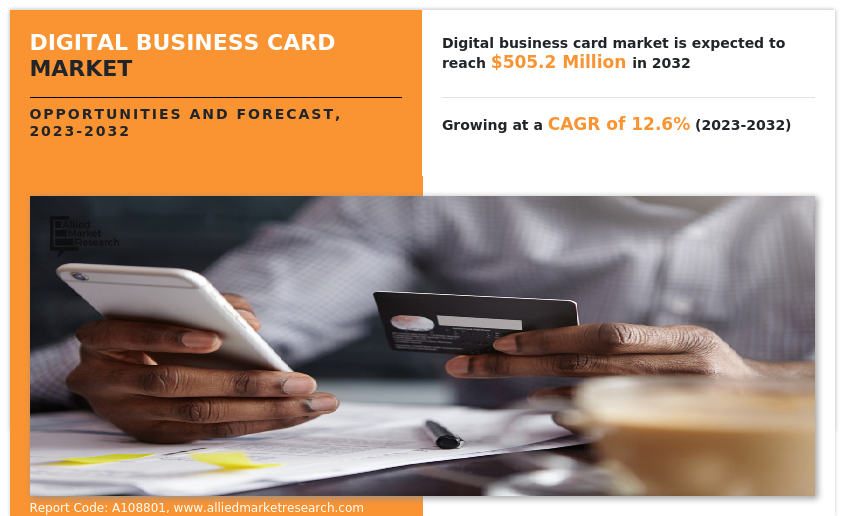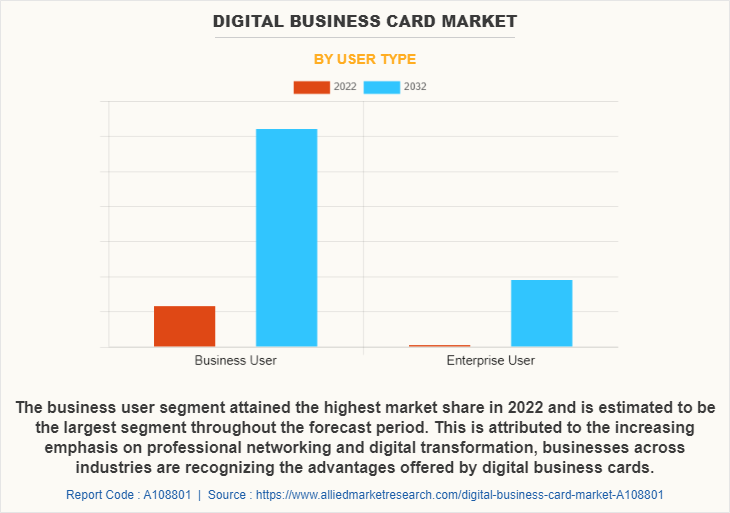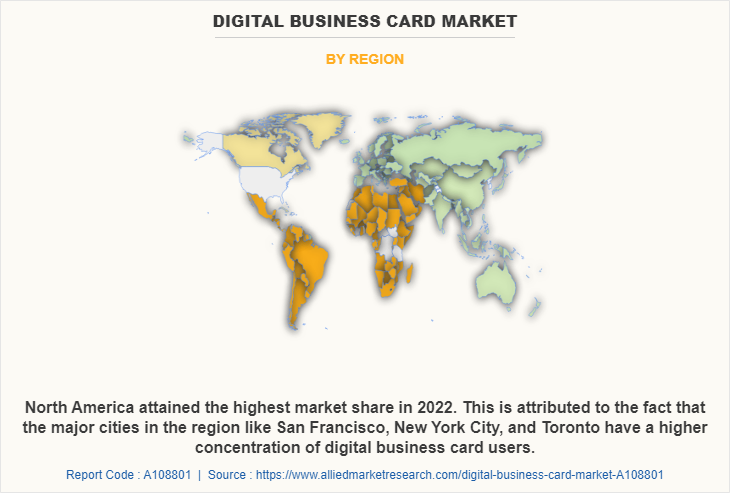Digital Business Card Market Overview
The global digital business card market was valued at $159.4 million in 2022, and is projected to reach $505.2 million by 2032, growing at a CAGR of 12.6% from 2023 to 2032. Rising e-commerce, mobile payment trends, increasing middle-class disposable incomes, and the convenience of digital cards offered to both consumers and businesses contribute to the growth of the market.
Market Dynamics & Insights
- The digital business card industry in North America held a significant share of 35% in 2022.
- The digital business card industry in India is expected to grow significantly at a CAGR of 19.5% from 2023 to 2032.
- By platform, the android segment is one of the dominating segment in the market, accounting for the revenue share of over 64% in 2022.
- By user type, the business user segment dominated the industry in 2022 and accounted for the largest revenue share of 67%.
Market Size & Future Outlook
- 2022 Market Size: $159.4 Million
- 2032 Projected Market Size: $505.2 Million
- CAGR (2023-2032): 12.6%
- North America: Dominated the market in 2022
- Asia Pacific: Fastest growing market
What is Meant by Digital Business Card
Digital business card, also called as a virtual or electronic business card, is a virtual mode of sharing professional profile details such as name, contact number, website, location, photo social media links, and much more about an individual or business. Digital business cards typically contain contact information, such as name, title, company name, phone number, email address, and website URL. These may also include additional details such as social media profiles, professional summaries, or product/service information. The digital business card market is witnessing growth owing to technological advancements and increase in reliance on digital communication. It offers several advantages when compared with traditional printed cards. These include convenience, cost-effectiveness, eco-friendliness, and the ability to incorporate interactive features like clickable links, videos, or QR codes.

The contactless interactions have emerged as a significant driver of the digital business card market, revolutionizing the way professionals connect and exchange information. The demand for digital business cards has surged with the rise of remote work and digital networking. Further, the increasing need for seamless and hygienic interactions, traditional paper-based business cards have taken a backseat, making room for innovative digital alternatives. Furthermore, as smartphone penetration increases, the demand for digital business card solutions grows, as individuals and organizations seek efficient ways to manage and share their professional information. In addition, digital business cards offer a convenient and eco-friendly alternative to traditional paper cards, allowing users to exchange contact details instantly through their smartphones.
Moreover, as more and more companies and professionals embrace environmentally conscious practices, the market is poised to witness further growth and adoption. However, despite the growing popularity of digital solutions in various aspects of business, many individuals and organizations remain unaware of the advantages and possibilities offered by digital business cards. In addition, the fear of data breaches, identity theft, and unauthorized access to sensitive information acts as a significant deterrent for adopting digital business cards. On the contrary, sustainability and cost savings are driving the demand for more efficient and eco-friendly solutions. The emergence of several digital business card start-ups is creating new opportunities for innovation in networking solutions, hence, the digital business card market is well-positioned to capitalize on this opportunity and experience significant growth in the coming years.
The report focuses on growth prospects, restraints, and trends of the digital business card market analysis. The study provides Porter’s five forces analysis to understand the impact of various factors, such as bargaining power of suppliers, competitive intensity of competitors, threat of new entrants, threat of substitutes, and bargaining power of buyers on the digital business card market demand.
Digital Business Card Market Segment Review
The digital business card market is segmented on the basis of platform, user type and region. By platform, it is segmented into android, iOS, and windows. By user type, it is segmented into business user and enterprise user. Region wise, it is analyzed across North America, Europe, Asia-Pacific, and LAMEA.

Based on user type, the business user segment emerged as the dominant segment in the digital business cards market in 2022, capturing the highest market share. This is attributed to the increasing emphasis on professional networking and digital transformation, businesses across industries are recognizing the advantages offered by digital business cards. The convenience, flexibility, and eco-friendly nature of digital alternatives have resonated particularly well with business users, driving their rapid adoption and market dominance. There is a growing need for digital business cards as professionals seek more sustainable and interactive ways to network. As the digital business cards market continues to evolve, the business user segment is expected to maintain its momentum, further solidifying its position as the fastest-growing segment in digital business card industry.

Region wise, North America attained the highest growth in 2022 owing to the presence of strong technology foundation and extensive smartphone penetration. Moreover, the major cities like San Francisco, New York City, and Toronto have a higher concentration of digital business card users. Digital business card suppliers are expanding their offerings to include customizable and interactive features. However, the Asia-Pacific region is considered to be the fastest growing region during the forecast period owing to the increase in penetration of smartphones along with rise in need for contactless corporate communication. Moreover, countries such as China, Japan, and India are likely to be important contributors toward the growth of the Asia-Pacific digital business card market share.
The report analyzes the profiles of key players operating in digital business card market such as Blinq Technologies Pty Ltd., Haystack, HiHello, Inc., Itzme, Mobilo, Popl, Spreadly GmbH, Tap, Uniqode Phygital, Inc.(Beaconstac), and Virtual Business Card. These players have adopted various strategies to increase their market penetration and strengthen their position in the digital business card industry. Digital business card companies are revolutionizing the way individuals and businesses share contact information.
Market Landscape and Trends
The future of the digital business card market is positive, with several exciting trends and opportunities on the horizon. As technology continues to advance, traditional paper business cards are being replaced by digital alternatives that offer greater convenience, versatility, and interactivity. One of the key trends is the integration of augmented reality (AR) and virtual reality (VR) elements into digital business cards. As AR and VR technologies allow users to showcase their products, services, or portfolio in immersive and interactive ways, creating memorable and engaging experiences. Furthermore, another trend is the rise of contactless networking solutions, fuelled by the global pandemic and the increasing emphasis on hygiene. Thus, digital business cards enable individuals to exchange contact information seamlessly using QR codes, NFC (Near Field Communication), or other wireless technologies, eliminating the need for physical contact.
Moreover, personalization and data analytics are becoming crucial aspects of digital business cards. Through AI-powered algorithms and data tracking, businesses can gather valuable insights about user engagement, preferences, and networking patterns, enabling them to tailor their marketing strategies effectively. In addition, the growing focus on sustainability and eco-friendly practices presents an opportunity for digital business cards to replace their paper counterparts, reducing waste and environmental impact. Hence, the future of the digital business card market growth is bright, with innovative technologies and evolving needs shaping its growth and offering ample opportunities for businesses to stand out in a digital world. Innovative digital business cards are transforming traditional networking by integrating features like QR codes and real-time updates. Therefore, these are some of the major market trends of digital business card market size.
What are the Top Impacting Factors in Digital Business Card Market
Increase in Environmental Concerns
Environmental concerns pertaining to use of paper for making physical business cards has become a significant driver of the digital business card market, as businesses and professionals are increasingly seeking sustainable alternatives to traditional paper-based business cards. Digital business cards offer a viable solution by eliminating the need for physical card production and disposal with the growing recognition of the environmental impact of deforestation and paper waste. Thus, individuals and organizations significantly reduce their carbon footprint and contribute to a greener future, by opting for digital business cards. For instance, a large number of multinational corporations recently switched to digital business cards for their employees, resulting in a significant reduction in paper usage and waste generation. This not only aligned with their commitment to sustainability but also showcased their dedication to embracing innovative digital solutions. Hence, the digital business card market is poised to witness growth and adoption, as more companies and professionals embrace environmentally conscious practices.
Increase in Smartphone Penetration
Professionals and businesses are relying on digital platforms to connect and share information with the widespread adoption of smartphones globally. Furthermore, digital business cards offer a convenient and eco-friendly alternative to traditional paper cards, allowing users to exchange contact details instantly through their smartphones. The demand for digital business card solutions increases with rise in smartphone penetration, , as individuals and organizations seek efficient ways to manage and share their professional information. For instance, in a networking event, instead of handing out physical business cards, attendees simply exchange digital cards by using smartphone apps or Near Field Communication (NFC) technology, streamlining the process and ensuring that the information is readily accessible and up to date.
Moreover, the growing number of smartphone users plays a significant role in the growth of digital business cards since it can be easily accessed by everyone. Thus, this factor is creating new opportunities for businesses and professionals to establish connections and promote their brand in a modern, efficient, and environmentally friendly way.
Rapid Increase in Contactless Interaction
Contactless interactions have emerged as a significant driver of the digital business card market, revolutionizing the way professionals connect and exchange information. Traditional paper-based business cards have taken a backseat, making room for innovative digital alternatives with the increasing need for seamless and hygienic interactions. For instance, professionals turned to digital business cards to maintain social distancing protocols while still networking effectively, during the COVID-19 pandemic. These digital cards can be easily shared by tapping or scanning them with a smartphone, eliminating the need for physical contact, thus providing a more efficient and convenient way to exchange contact information. Therefore, digital business cards enable professionals to instantly share their details, including name, designation, company, and contact information, while also allowing for easy integration with existing contact management systems, by leveraging technologies like Near Field Communication (NFC), QR codes, or mobile apps. Thus, the contactless nature of these interactions has propelled the growth of the digital business card market, catering to the evolving needs of professionals in the digital age.
Lack of Awareness and Adoption
The lack of awareness and adoption acts as a significant restraint for the digital business card market. Many individuals and organizations remain unaware of the advantages and possibilities offered by digital business cards despite the growing popularity of digital solutions in various aspects of business. Furthermore, traditional paper-based business cards has been the norm for decades, and there is a certain level of inertia that hinders the widespread acceptance of digital alternatives. In addition, some professionals may be resistant to change or reluctant to adopt new technologies, leading to a slower uptake of digital business cards. Moreover, the absence of standardized platforms and a wide range of available options can further confuse potential users and discourage them from exploring digital alternatives. As a result, the lack of awareness and adoption acts as a constraint for the digital business card market, impeding its growth and potential to revolutionize the way of exchanging contact information.
Privacy and Security Concern
The use of digital business cards has become popular as businesses increasingly rely on digital platforms for networking and communication. However, individuals and organizations are becoming cautious about sharing personal and professional information online due to potential risks. The fear of data breaches, identity theft, and unauthorized access to sensitive information acts as a significant deterrent for adopting digital business cards. Moreover, new threats and vulnerabilities emerge from hackers, as the digital world continues to evolve, making it challenging to ensure robust security measures. Thus, individuals may be hesitant to embrace digital business cards, fearing that their information might be compromised or misused, without proper safeguards. Therefore, addressing privacy concerns and implementing robust security measures are crucial for gaining trust and encouraging wider adoption of digital business cards.
Offers Sustainability and Cost Saving
The need for sustainable practices have become a major practice by businesses around the globe. Therefore, by adopting the digital business cards, businesses contribute towards the sustainability of the environment by reducing paper waste which is caused due to printing visiting cards on papers. Thus, companies can demonstrate their commitment to sustainability while also reaping cost-saving benefits, by embracing digital business cards.
Furthermore, traditional paper-based business cards are being replaced by their digital counterparts, as more businesses and professionals embrace environmentally conscious practices. Thus, digital business cards not only eliminate the need for paper production and printing, reducing waste and carbon footprint, but they also offer long-term cost savings. Therefore, businesses create and distribute digital business cards at a fraction of the cost associated with traditional printing, by leveraging digital platforms and technologies. In addition, digital business cards provide flexibility, allowing users to easily update and share their contact information in real-time. Hence, sustainability and cost savings is driving the demand for efficient and eco-friendly solutions. Therefore, the digital business card market is well-positioned to capitalize on this digital business card market opportunity and experience significant growth in the coming years as businesses adopt eco-friendly and cost saving options like adoption of digital business cards.
What are the Key Benefits for Stakeholders
- This report provides a quantitative analysis of the market segments, current trends, estimations, and dynamics of the digital business card market forecast from 2023 to 2032 to identify the prevailing market opportunities.
- The market research is offered along with information related to key drivers, restraints, and opportunities.
- Porter's five forces analysis highlights the potency of buyers and suppliers to enable stakeholders make profit-oriented business decisions and strengthen their supplier-buyer network.
- In-depth analysis of the digital business card market segmentation assists to determine the prevailing market opportunities.
- Major countries in each region are mapped according to their revenue contribution to the global market.
- Market player positioning facilitates benchmarking and provides a clear understanding of the present position of the market players.
- The report includes the analysis of the regional as well as global digital business card market trends, key players, market segments, application areas, and market growth strategies.
Digital Business Card Market Report Highlights
| Aspects | Details |
| Market Size By 2032 | USD 505.2 million |
| Growth Rate | CAGR of 12.6% |
| Forecast period | 2022 - 2032 |
| Report Pages | 298 |
| By Platform |
|
| By User Type |
|
| By Region |
|
| Key Market Players | Mobilo, Blinq Technologies Pty Ltd., tap, Virtual Business Card, Uniqode Phygital, Inc.(Beaconstac), Haystack, HiHello, Inc., itzme, Popl, Spreadly GmbH |
Analyst Review
The digital business card market has witnessed significant growth and evolution in recent years, reflecting the changing landscape of networking and professional communication. One prominent trend is the shift from traditional paper-based business cards to digital alternatives. Digital business cards offer several advantages, including increased accessibility, convenience, and eco-friendliness. These can be easily shared and exchanged using smartphones, eliminating the need for physical cards, and simplifying the process of networking. Furthermore, another trend is the incorporation of advanced features and customization options into digital business cards. Users can now create interactive cards with multimedia elements such as videos, links to social media profiles, and dynamic contact information. In addition, data analytics and integration capabilities have become crucial in the digital business card market. Companies are increasingly looking for solutions that allow seamless synchronization with customer relationship management (CRM) systems and provide valuable insights into networking patterns and engagement. Moreover, artificial intelligence (AI) and machine learning are contributing toward the growth of the digital business card market. Hence, the digital business card market is driven by the need for efficient, flexible, and technologically advanced networking tools in the digital age.
Furthermore, market players are adopting strategies like product launch for enhancing their services in the market and improving customer satisfaction. For instance, in October 2022, Scard developed a digital business card, digitally printed, or created through tangible contacts, such as NFC-qualified stickers. It is a Singapore-based start-up that allows users to share their cards with the connections through a URL or QR code. It is also a virtual card that enables users to connect, share, and communicate on the specific desired channel. Therefore, such strategies are expected to boost the growth of the digital lending market in the upcoming years.
Some of the key players profiled in the report include Blinq Technologies Pty Ltd., Haystack, HiHello, Inc., Itzme, Mobilo, Popl, Spreadly GmbH, Tap, Uniqode Phygital, Inc.(Beaconstac), and Virtual Business Card. These players have adopted various strategies to increase their market penetration and strengthen their position in the industry.
The Digital Business Card Market will expand at a CAGR of 12.6% from 2023-2032
the market value of Digital Business Card Market Market by the end of 2032 will be $505.15 million
The factors that drives Digital Business Card Market Growth are: Increase in environmental concerns Increase in smartphone penetration Rapid increase in contactless interaction
The leading players in Digital Business Card Market are Blinq Technologies Pty Ltd., Haystack, HiHello, Inc., Itzme, Mobilo, Popl, Spreadly GmbH, Tap, Uniqode Phygital, Inc.(Beaconstac), and Virtual Business Card
Loading Table Of Content...
Loading Research Methodology...



